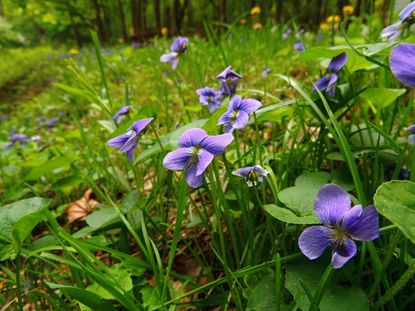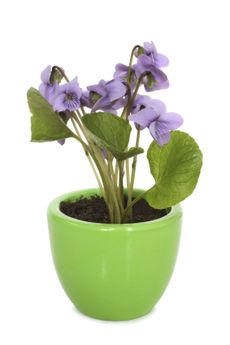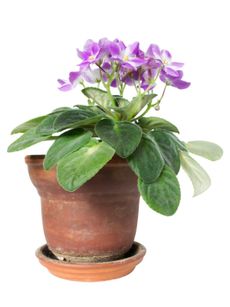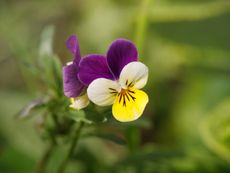Wild Violets Care - How To Grow Wild Violet Plants


Learning to grow violet flowers is easy. In fact, they pretty much take care of themselves in the garden. Keep reading to learn more about wild violets care.
Wild Violet Flowers
Wild violets (Viola odorata) have heart-shaped leaves with purple-blue flowers. Some varieties also have white or yellow blooms. Although in some areas they are considered annuals or biennials, wild violets often self-seed, coming back each year in unexpected locations.
The flowers that are low on the plant, referred to as cleistogamous flowers, do not open but instead produce and house seeds, allowing the plant to readily reproduce.
The only downside to this attribute is the fact that wild violets have a tendency to become invasive, popping up nearly everywhere, if not controlled with some type of barrier. Wild violet plants also spread through underground rhizomes.
Growing Wild Violet Plants in the Garden
Growing violets is easy and with care they have many uses in the garden. Wild violets make great accents around trees, near water sources, and beds. They also make excellent choices for instant ground cover in a woodland garden. They can even be grown in containers.
Both the leaves and flowers (which bloom in late winter and early spring) are also edible and rich in vitamins. Violets can be planted nearly anytime throughout spring and fall, though early spring is preferable. These plants enjoy light shade but will also thrive in sunny locations. While they tolerate many soil types, wild violets prefer soil that is moist, yet well-draining, and rich in organic matter.
Wild Violets Care
When growing violets, other than watering following planting and occasional watering throughout the growing season, wild violet flowers require very little care. These resilient little plants tend to take care of themselves. If desired, cutting the flower stalks back can help alleviate problems with spurting seeds. T
Gardening tips, videos, info and more delivered right to your inbox!
Sign up for the Gardening Know How newsletter today and receive a free download of our most popular eBook "How to Grow Delicious Tomatoes."
hose choosing to propagate wild violets can divide established plants in spring or fall, though their self-seeding capabilities make this unnecessary. Seeds can also be collected and then sown in fall either indoors or in a cold frame. Wild violet plants are not usually affected by many problems, however, their foliage is occasionally affected by spider mites in dry weather.

Nikki Tilley has been gardening for nearly three decades. The former Senior Editor and Archivist of Gardening Know How, Nikki has also authored six gardening books.
-
 10 Best Apartment Plants To Turn Your Small Space Into An Oasis
10 Best Apartment Plants To Turn Your Small Space Into An OasisThe best apartment plants can lend an ambience of the tropics, brighten up a space, or add a touch of drama, and turn an apartment into a relaxing oasis.
By Amy Grant
-
 Grow a Bathroom Oasis: 8 Best Bathroom Plants With No Light or Low Light
Grow a Bathroom Oasis: 8 Best Bathroom Plants With No Light or Low LightSome apartment dwellers grow the best bathroom plants with no light or low light. Read how one of our favorite plant lovers does it in the big city.
By Teo Spengler
-
 Are Violets Edible – Violet Flower Uses In The Kitchen
Are Violets Edible – Violet Flower Uses In The KitchenOne extremely common plant, the violet, is widely known for its presence as a wildflower and also has its place in well-maintained and cultivated gardens too. But, did you know that eating violet flowers is popular as well? Learn more in this article.
By Tonya Barnett
-
 Care Of Indoor Violets: How To Grow Violets Indoors
Care Of Indoor Violets: How To Grow Violets IndoorsViolets are easy to love. They're beautiful, they're fragrant, and they're virtually maintenance-free. So it only makes sense to want to bring that into your home. But can you grow violets inside? Learn more in this article.
By Liz Baessler
-
 Potted Violet Plants: Tips For Growing Violets In Containers
Potted Violet Plants: Tips For Growing Violets In ContainersViolets are versatile, and growing violets in containers is no problem at all. Want to learn how to plant violets in pots? This article can help with that. Simply click here for more information on growing and caring for container grown violets.
By Mary H. Dyer
-
 Varieties Of Violets: Different Types Of Violets
Varieties Of Violets: Different Types Of VioletsThere are around 400 types of violet plants in the genus Viola. The many violet plant varieties guarantee there is a sweet little Viola perfect for almost any gardening need. Learn more about these amazing little plants in this article.
By Bonnie L. Grant
-
 Johnny Jump Up Flowers: Growing A Johnny Jump Up Violet
Johnny Jump Up Flowers: Growing A Johnny Jump Up VioletFor a small and delicate flower that makes a big impact, you can't go wrong with johnny jump ups. The cheery purple and yellow flowers are easy to care for. Learn more about them in this article.
By Anne Baley
-
 Killing Wild Violets - Tips For Wild Violet Control
Killing Wild Violets - Tips For Wild Violet ControlControlling wild violets in the lawn may be one of the most difficult gardening problems a homeowner can face. Those pretty little plants can quickly take over a lawn. Get tips for their control in this article.
By Jackie Rhoades